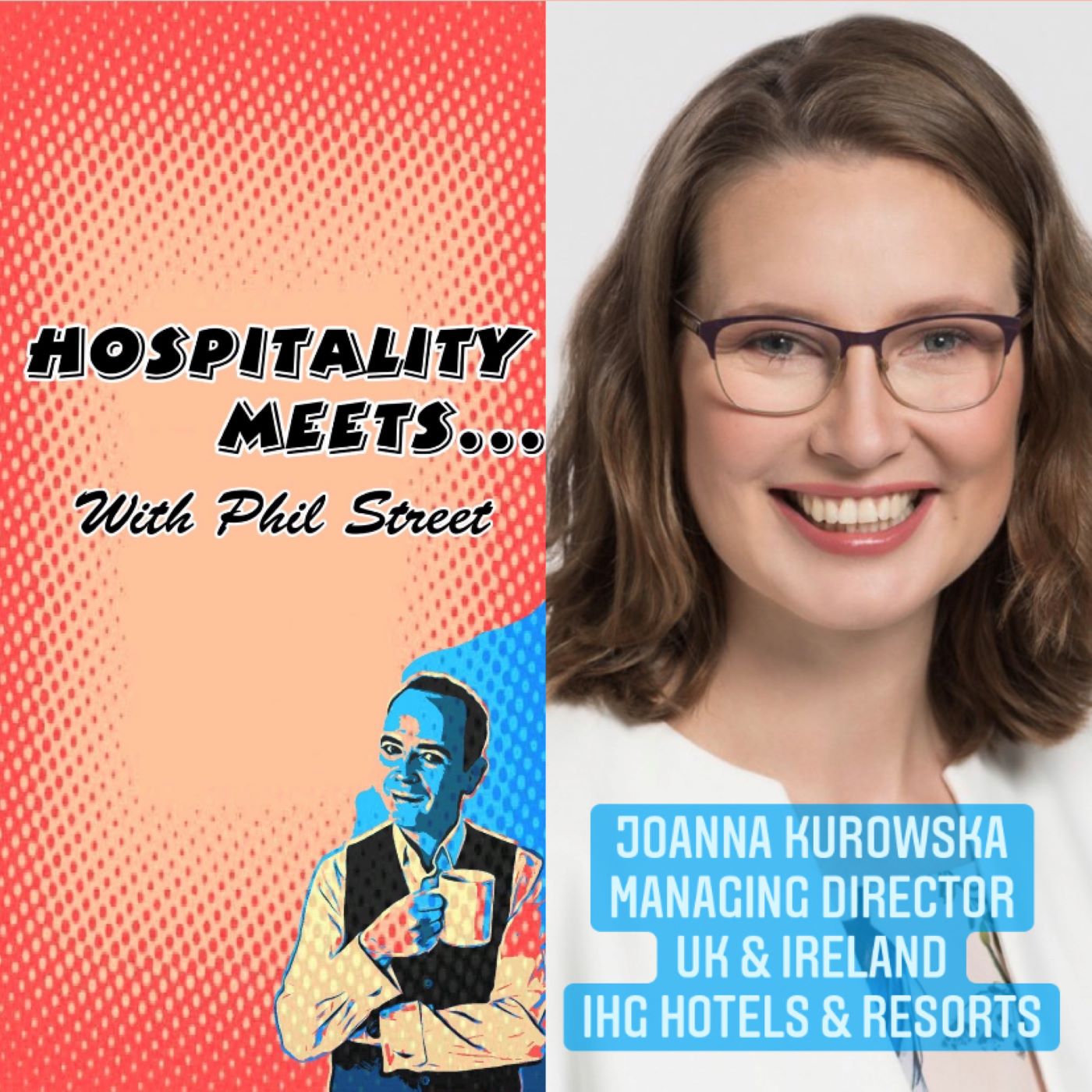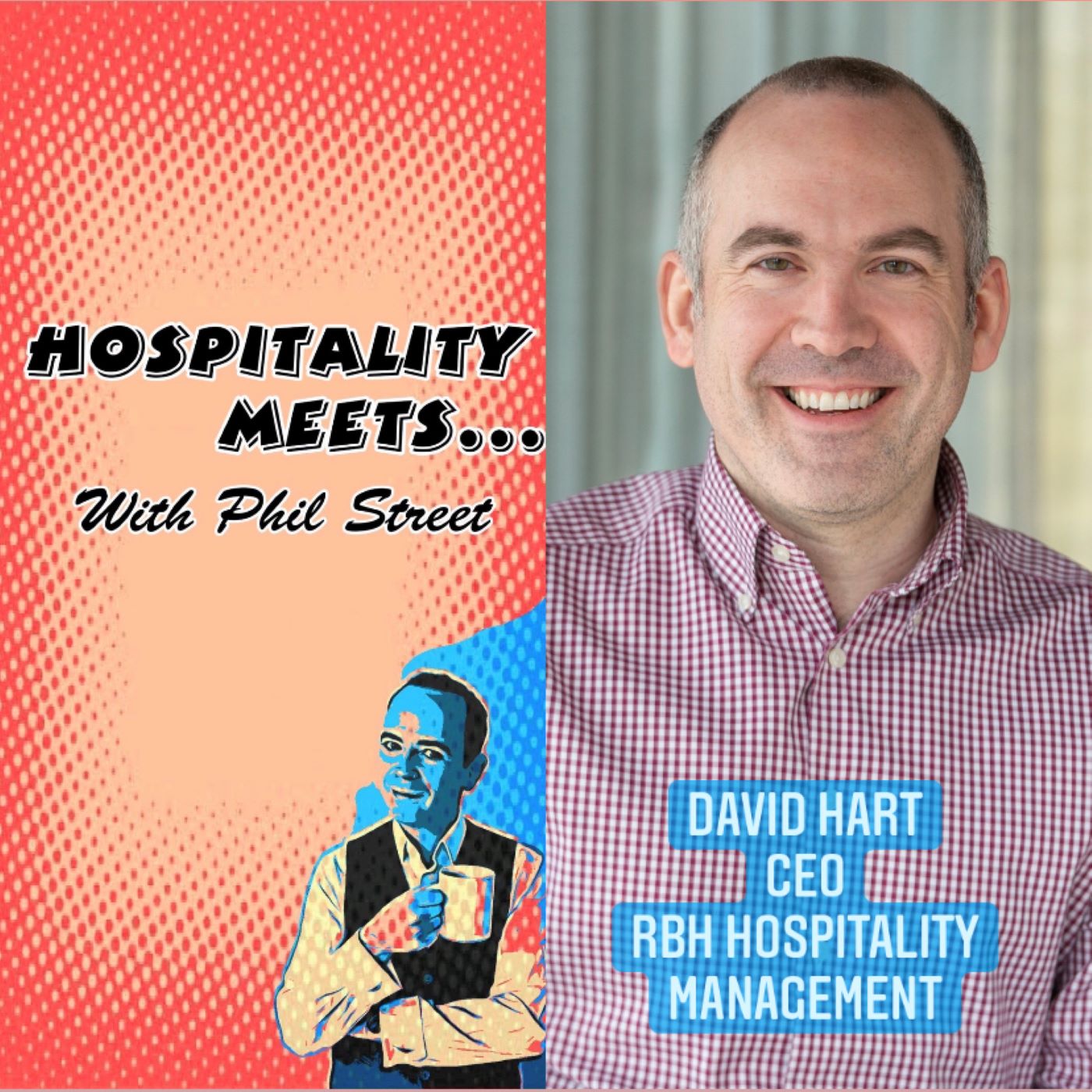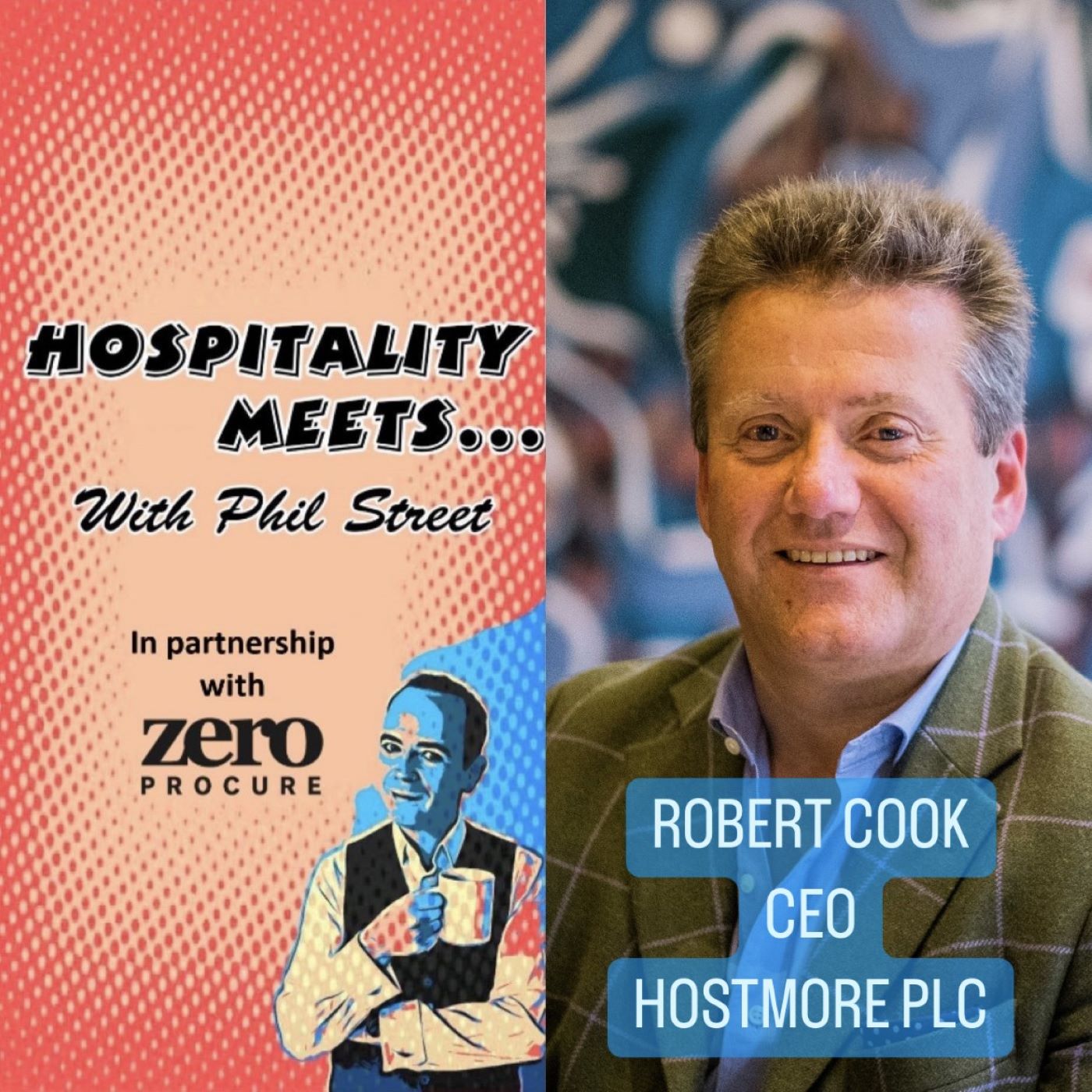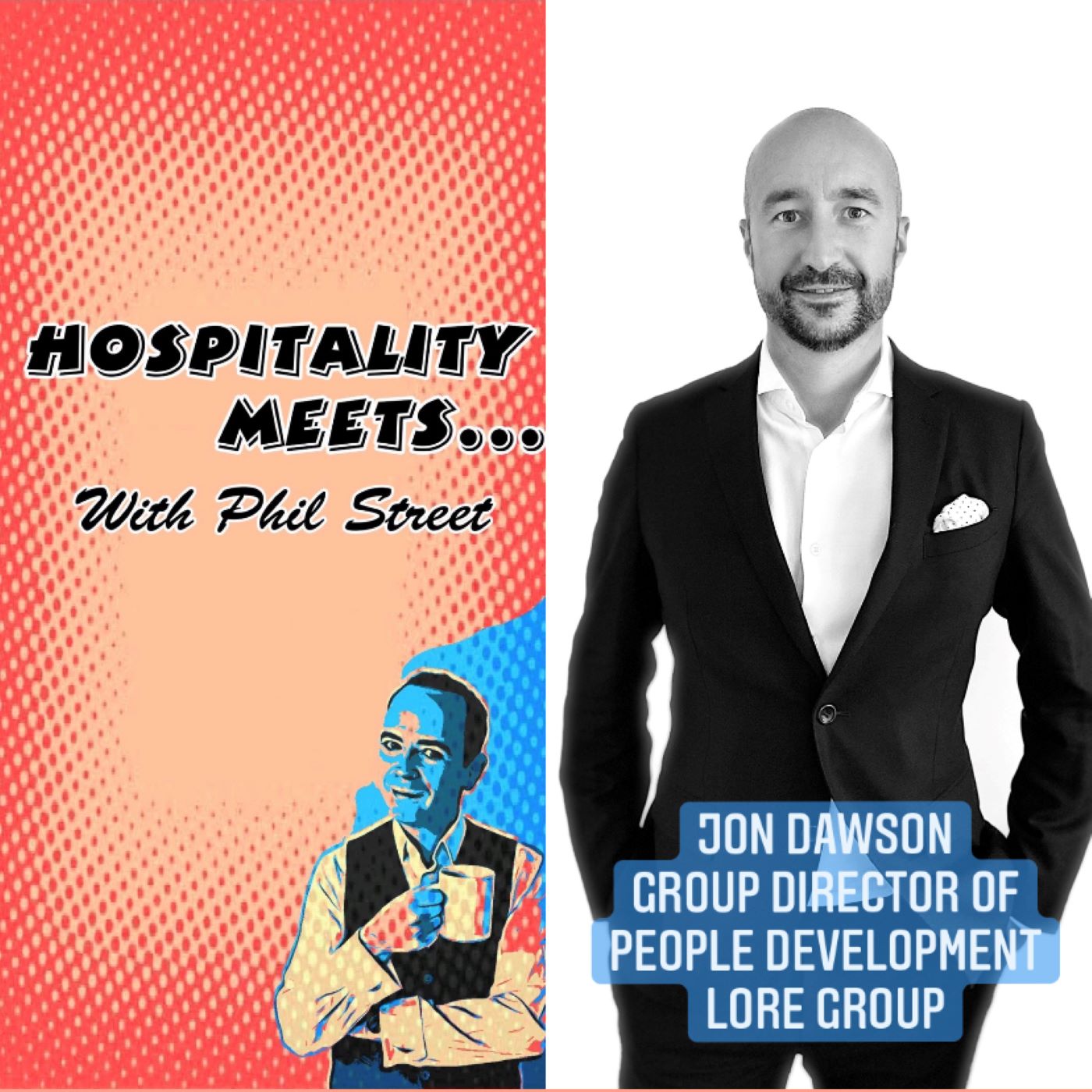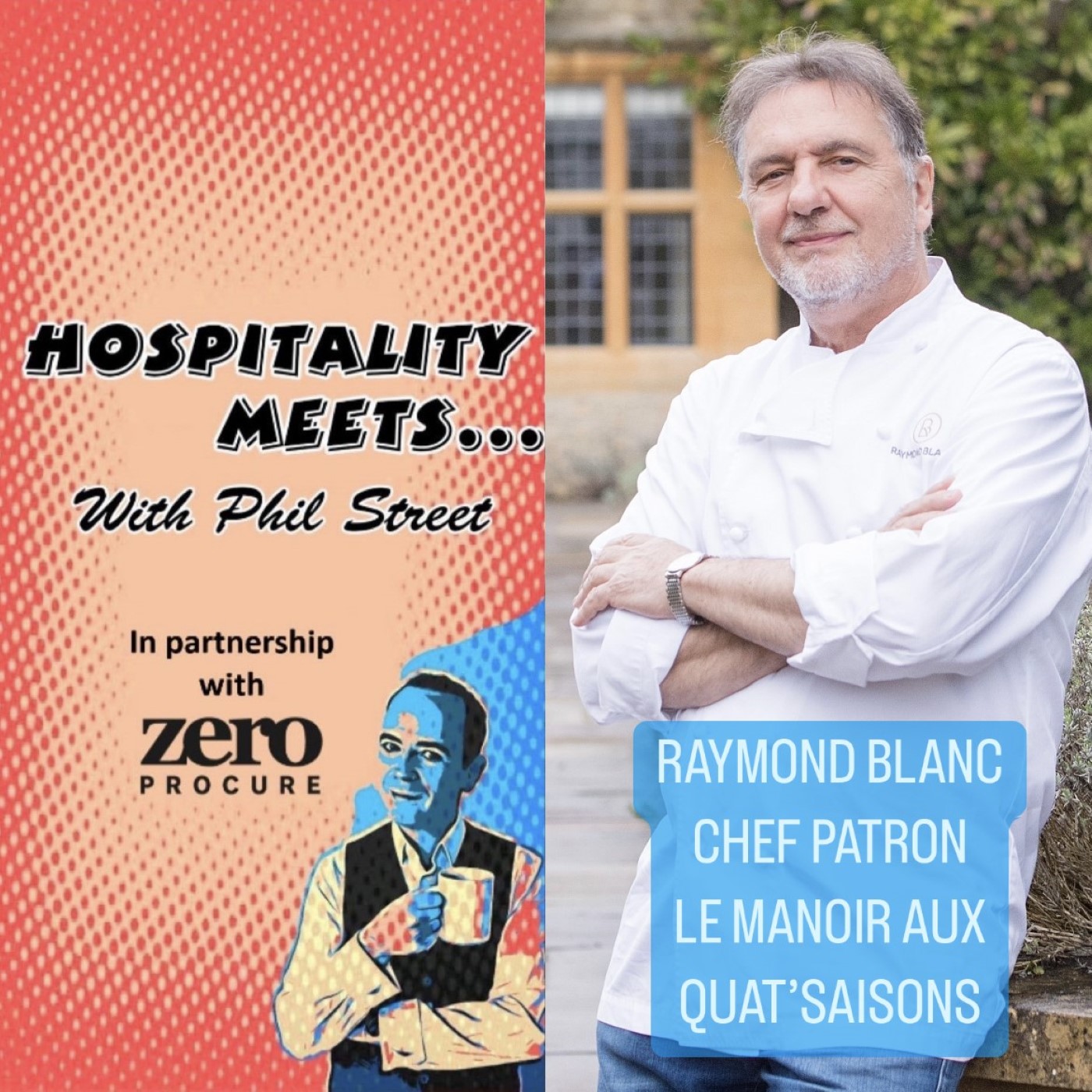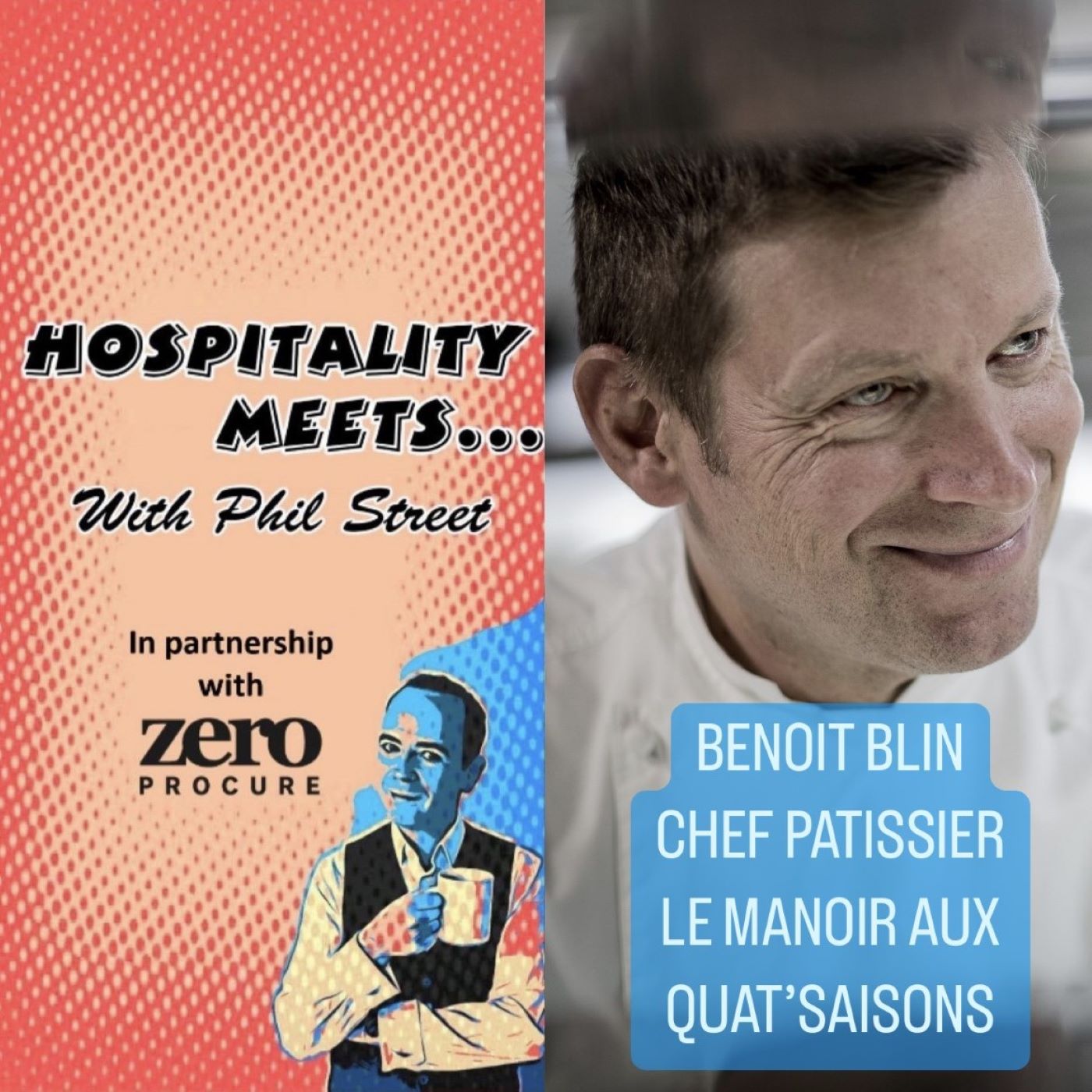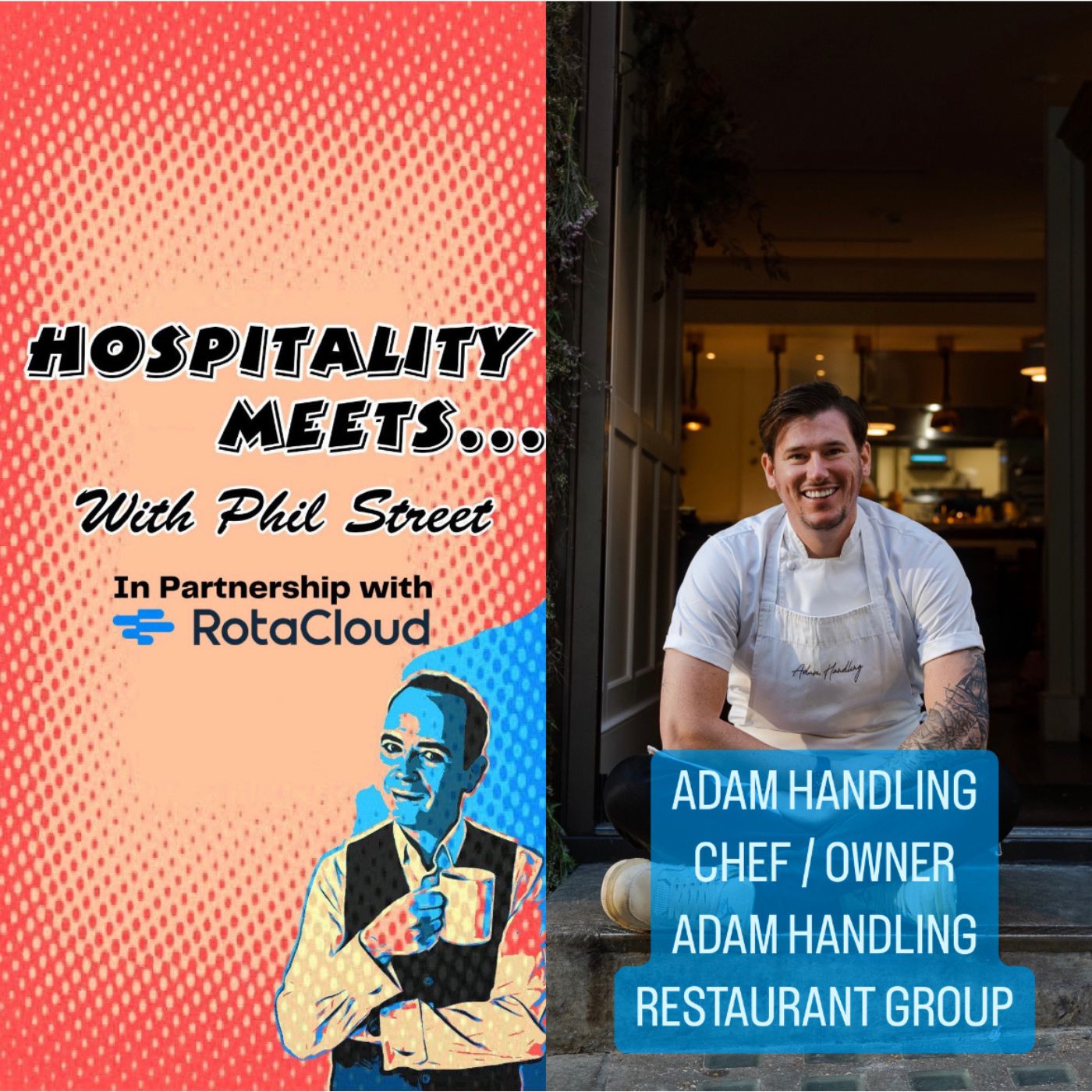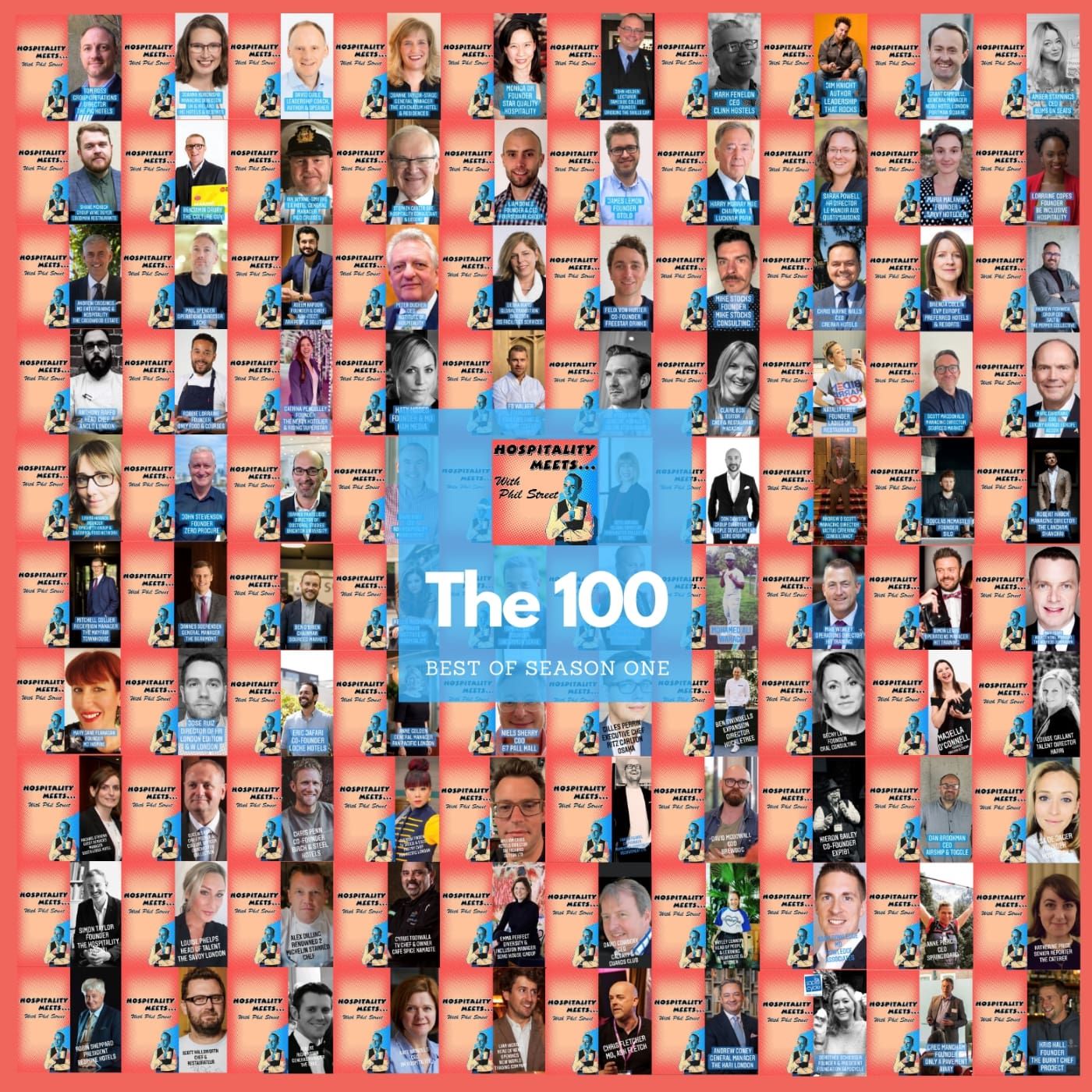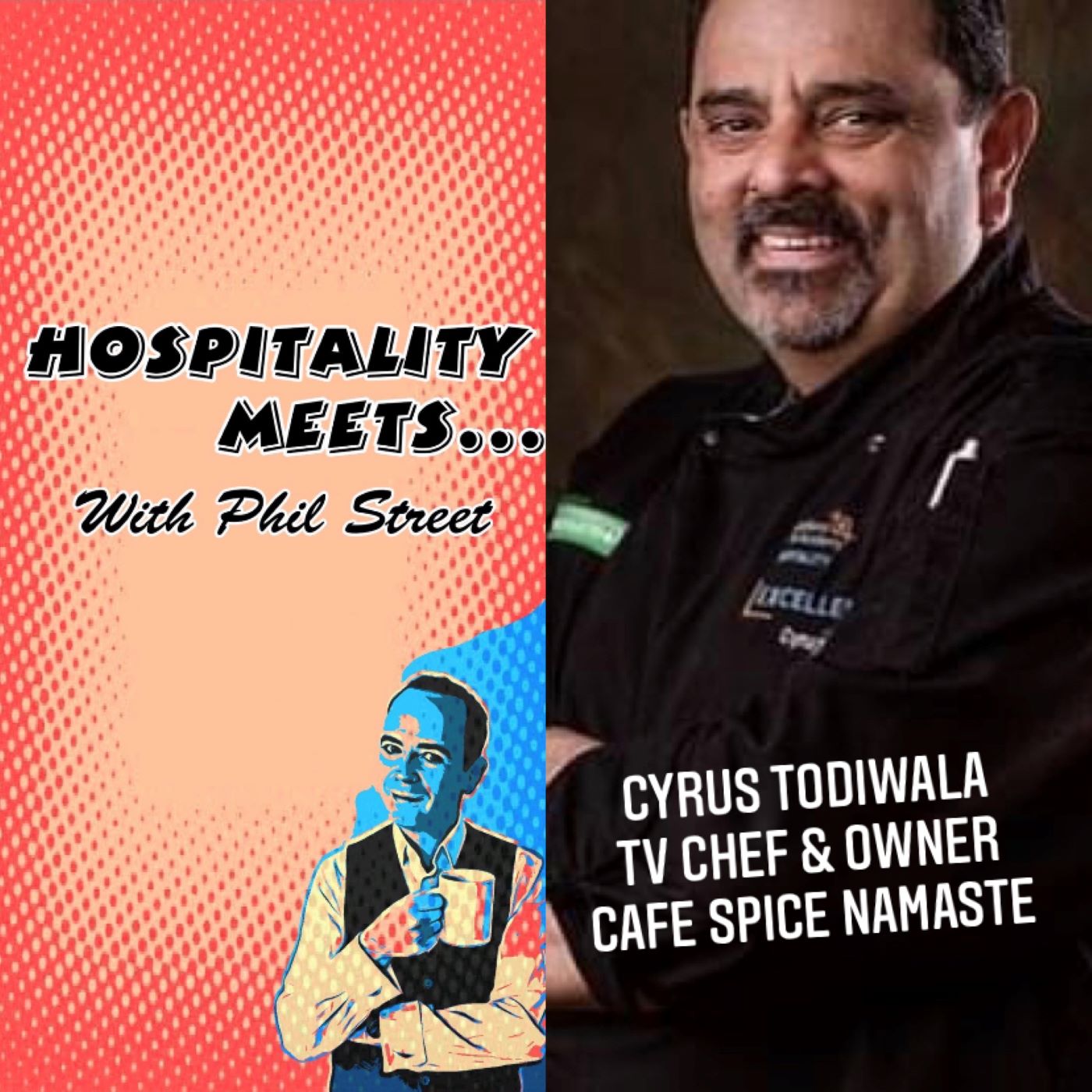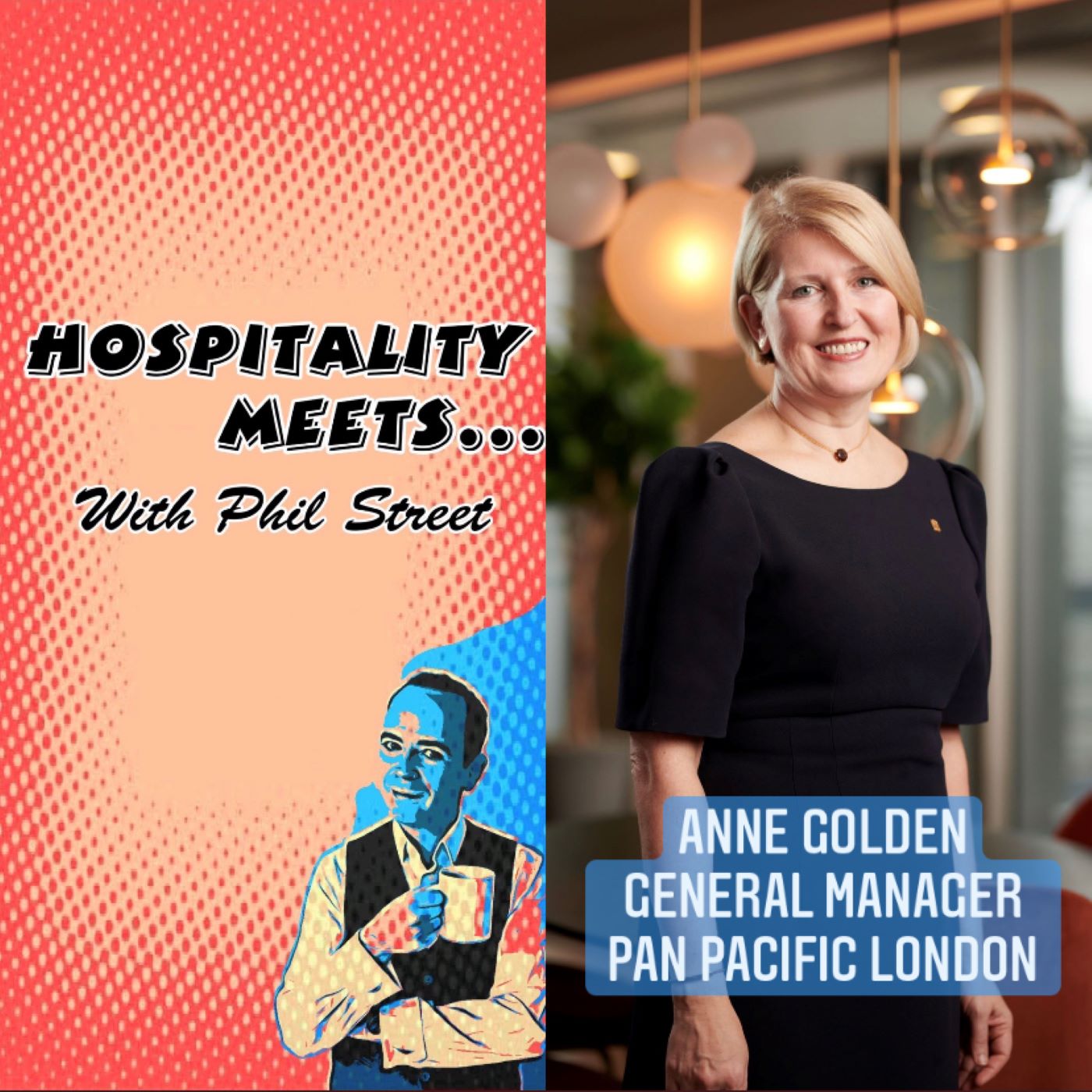#202 - Hospitality Meets Roshana Gammampila - Farm-to-Table Tea Dreams and Community Impact

Someone once said to me that coffee tastes better when it's doing some good. Well today, we can apply that same mindset to Tea.
Summary: In this engaging and insightful episode of "Hospitality Meets," Phil sits down with the inspiring Roshana Gammampila, who shares her incredible journey from a corporate career in London to managing a tea estate in Sri Lanka. This episode is filled with fascinating discussions, enlightening takeaways, and a sprinkle of fun as Roshana dives into the world of tea, sustainability, and social impact.
Key Takeaways:
- Cultural Connections and Challenges:
- Roshana talks about Sri Lanka's Palm Tee community, their economic struggles, and the importance of fair compensation for tea producers.
- Discover the traditional methods in tea production and the effort to revolutionize it for modern sustainability.
- Entrepreneurial Journey:
- Roshana shares her unique career path, from international aid to corporate tech and finally to entrepreneurship in the tea industry.
- Learn how her background in social justice and non-linear career moves have shaped her approach to business.
- The Farm-to-Table Model:
- A deep dive into Roshana’s vision for a farm-to-table tea brand in the UK, aiming to shorten supply chains and improve economic outcomes for tea workers.
- Understand the benefits of this model, including lower consumer prices, better retailer margins, and higher quality products.
- Life Transition:
- The episode sheds light on Roshana's personal shifts, influenced by family moves and adopting two sons, highlighting the balance between work and unexpected parental responsibilities.
- Tea Industry Insights:
- Eye-opening details about the financial and physical struggles in the tea industry, focusing on the disparity of earnings between producers and retailers.
- Fun fact: The origin story behind the vanilla-infused tea that Roshana's estate produces, inspired by Melbourne's tea culture.
- Product and Packaging:
- Roshana’s dedication to sustainability shines through as she explains the 100% biodegradable packaging of their products.
- Hear about the painstaking process of perfecting the tea product, tackling issues like the drying process for quality consistency.
- Future Horizons:
- The exciting future plans for mainstream retail distribution and partnerships in hospitality for in-room tea services.
- Roshana reveals upcoming opportunities for online purchases, making their delicious and ethically produced teas more accessible.
Fun Moments:
- Phil enjoying a cup of Roshana's vanilla-infused tea during the interview.
- Roshana reflecting on the unpredictability and learning experiences of running a tea estate.
- The surprising realisation of career alignment with her early aspirations, making for a heart warming listen.
Listen Now: Join Phil and Roshana for an episode that not only delves into serious social and industry issues but also brims with personal stories, passion for tea, and ambitions to create meaningful change. Tune in for a delightful, informative, and inspiring conversation!
Contact & Follow:
Guest:
Roshana Gammampila - Instagram - https://www.instagram.com/devagiri_estate/
Devagiri Estate - https://www.devagiri-teas.com/
Don't miss this heartfelt and inspiring episode to get your dose of motivation and perhaps a sip of something new and refreshing!
The Sponsor
Today’s episode comes to you in partnership with RotaCloud, the people management platform for shift-based teams.
RotaCloud lets managers create and share rotas, record attendance, and manage annual leave in minutes — all from a single, web-based app.
It makes work simple for your team, too, allowing them to check their rotas, request holiday, and even pick up extra shifts straight from their phones.
Try RotaCloud’s time-saving tools today by heading to https://rotacloud.com/phil
This podcast uses the following third-party services for analysis:
Podcorn - https://podcorn.com/privacy
Phil [00:00:00]:
And a huge hospitality meets. Welcome to Roshana Gamampilla.
Roshana Gammampila [00:00:04]:
Hello. Thank you.
Phil [00:00:05]:
How are you doing?
Roshana Gammampila [00:00:06]:
Very well, thank you. Thank you for having me.
Phil [00:00:08]:
You're very, very welcome. And this is probably a question that I always ask, but with you it's maybe a little bit more important because we're in a time zone difference for this discussion. So where are you at this moment?
Roshana Gammampila [00:00:21]:
I'm in Sri Lanka and the time is 2:00 in the afternoon, eight minutes past two.
Phil [00:00:27]:
Okay. And I'm recording at 9:30 in the morning or something like that. So there's the time difference. And what makes you be there? What are you doing out there?
Roshana Gammampila [00:00:35]:
Well, we have a tea estate here and I mean, that's fundamentally why we're here. We relocated to Sri Lanka in July. We've been kind of running things remotely for the previous sort of 18 months and then made the big bold move. So it's been two months and I would say we are. Well, sorry, more almost three months now. Just about settled.
Phil [00:00:56]:
Great stuff. Okay. And, yeah, well, just tell the world what it is that you actually are doing there.
Roshana Gammampila [00:01:00]:
Okay. So it's funny, actually, I have imposter syndrome. Answering this question because we haven't done this for all that long. Yes, absolutely. I mean, the quick answer to your question would be, oh, we run a tea estate. But that just feels still very strange to say because we've only been doing it for just under two years and my background and my partner's background, but completely, completely removed. But yeah, we kind of left our London city careers and we raised funds to buy a tea estate and that's what we do now.
Phil [00:01:36]:
Fantastic. And I should say, and this is not like a soulless plug or anything, but I do have your vanilla infusion in my little brew right here, right now. And this, I mean, vanilla and tea for me are like, win, win, because I love vanilla and I love tea. So, yeah, cheers, thanks very much. Yes.
Roshana Gammampila [00:01:56]:
I'm so pleased. I'm so pleased. Yeah, the vanilla was interesting because it's not a combination that had really occurred to me. Not something I've come across. And then we were speaking to somebody who'd spent a lot of time in Melbourne and apparently there, this is quite a popular combination. So that's why we've done what we've done. Yeah, yeah.
Phil [00:02:18]:
I was introduced to vanilla in coffee in France actually maybe 10, 10 or so years ago. Changed my life.
Roshana Gammampila [00:02:27]:
Yeah.
Phil [00:02:27]:
No, vanilla in tea is doing the same thing.
Roshana Gammampila [00:02:30]:
Yeah. No, vanilla is a beautiful flavor and also kind of indigenous To Sri Lanka. So.
Phil [00:02:35]:
Yeah, great. Yeah. Yeah. Well, we'll get into what you're doing now in a lot more depth as we get through the conversation. But actually, what I'd love to do first, you already kind of touched upon it, is that this life that you have now is not the life that you had. So take us all the way back and just give us a kind of run through of your life and times and how you've ended up here.
Roshana Gammampila [00:02:55]:
Goodness. Yeah. So even. I mean, this is probably the most extreme, but even prior to this move, my career sort of. It just wasn't linear.
Phil [00:03:04]:
I like that.
Roshana Gammampila [00:03:05]:
I like that it wasn't linear, is the sort of sophisticated way of putting it was sort of random. But I was one of those kids that knew too early what they wanted to be. And I decided I wanted to be a lawyer. And then I did my A levels and had a gap year and spent some time in Romania working with kids with hiv. And that just had such a profound influence on me. I really enjoyed it. I found it rewarding. And I decided, actually I didn't want to be a lawyer anymore.
Roshana Gammampila [00:03:40]:
So I came back to the uk, started uni in Norwich and kind of suffered through my law degree for three years. Just totally disengaged, really, from this subject that I had thought would be my passion because I wanted to be an international aid worker. So I finished my law degree and I was so, so lucky to get a role at Save the Children straight out of uni. And the role, the reason I got the role was actually because of the law degree, because within fundraising, but in a sort of compliance type area, fundraising. So that's how I got in there. I spent the first six years of my career at Save the Children, where I did train to be an international aid worker, as was my dream, but in the event, my actual career there progressed in fundraising in London.
Phil [00:04:23]:
Right. I would imagine, and please correct me if I'm completely wrong here, but law and going into aid working is probably not a bad. Like, it's not a bad grounding to have, is it?
Roshana Gammampila [00:04:36]:
Yeah, so. Absolutely. So certainly in terms of the kind of human rights sort of side of aid. Yeah, there is. And actually it's funny you say that, because at Save the Children, in my last couple of years, I did a master's in law and political justice. So exactly as you. The penny dropped for me and I realized actually, perhaps it's a good thing that I have this background. And so I tried to sort of build on it.
Roshana Gammampila [00:04:57]:
And it's funny, you know, people often quote Steve Jobs, who said something along the lines of joy, the dots backwards. And as my career has gone on, I would say, as I said earlier, it's been random, but now, when I look back, everything has really taught me something that has been super valuable and I still rely on now.
Phil [00:05:15]:
Wonderful. I mean, there's a wonderful message in there right about the moment that you find yourself in. If whatever it is that you're doing is not connecting with you, maybe just stick it out and get to the end of that. And because you never know when that might then serve its purpose. Down your own story.
Roshana Gammampila [00:05:33]:
Absolutely. So, yeah, six years, I'd say, for children. So that would have taken me to being in my kind of late 20s. And I decided at the height of economic downturn that I'd like to leave the charity sector and move to private sector. Not perhaps the most commercial thinking on my part or most commercially aware thinking, but the reason for that was I was feeling like I kind of wanted a different challenge. I have this perception that actually in the private sector I would get that challenge. So I went looking for it and it took me, no joke, a year of application after application after application, before I even got an interview.
Phil [00:06:10]:
Is that right?
Roshana Gammampila [00:06:12]:
Yeah, it was, yeah.
Phil [00:06:15]:
And do you think that is because of the private sector's perception of the charity sector?
Roshana Gammampila [00:06:21]:
Yes, yes, I would say. Yes. That is ultimately what I think. I'm sure, though, that perhaps there were weaknesses in my CV as well, so I don't want to just blame it on external factors, but, yes, I think generally, and I did see this myself, having joined the private sector, there is a lack of understanding of what the transferable skillset might be.
Phil [00:06:40]:
Yeah.
Roshana Gammampila [00:06:41]:
And also London, so competitive.
Phil [00:06:43]:
Yeah. And sort of thinking about this just purely from a recruitment hat perspective, a recruitment by day, as it were, in inverted commas, whenever we're given briefs for things, of course, we're trying to tick as many boxes of that brief as possible. And if people are not conforming to the brief, it takes a very strong recruitment consultant to be able to say to their clients, look, this does not conform to your brief because of xyz, but you really need to see this person because of xyz. And that's where I suppose the real wonderment can happen from a consultative perspective when you're helping in that way. But I, you know, equally, I'm very guilty of seeing a CV and going, well, that doesn't fit, you know, and moving on to the next.
Roshana Gammampila [00:07:30]:
Yeah. And a CN is so limited, isn't It, I mean, yes, totally. So little you can clean and you get so many. So, yeah, but actually what happened really speaks to sort of what you're saying there. In the end, I was hired by my recruiter. So the recruitment consultant that had been working with you put me forward. No, actually, sorry, didn't put me forward. Had talked to me and said, there's nothing I can put you forward for, really.
Roshana Gammampila [00:07:55]:
But kept in touch with me and then actually said, well, actually, we think that your skillset could work here. So there was a recruitment company called Fresh Minds. They focused mainly on graduate recruitment, but they were part of a small group of companies, one area of which was a tech company. So I joined them in an operations role and that immediately gave me the opportunity to kind of broaden my skill set. And then from there I made a disastrous move that I won't talk about publicly. I only stayed at the next place for six months. It just wasn't a good fit at all. But then I found myself accepted to PwC and my role at PwC was really fortuitous.
Roshana Gammampila [00:08:36]:
I was one of their first technology hires. And I joined the firm just as it was thinking about digitizing, digitizing its own ways of working and automating and thinking about what that might mean for clients. And so I was really very much right place, right time. And so I was with them for six years and I had the opportunity to build their first tech and innovation function, which we scaled from 5 people to over 300 if you include our contractors and various people we're working with.
Phil [00:09:04]:
Wow.
Roshana Gammampila [00:09:05]:
Really interesting stuff.
Phil [00:09:06]:
Yeah, yeah, sounds it, sounds it. And look at that as well from a journey perspective of getting all of these rejections. And, you know, like, the lesson here for any people listening to the journey, you know, is don't look at the cv, look at the person, look at the potential of the person, because, you know, to go from all of those rejections then into that role, I mean, everybody probably in the world has heard the PWC quite, quite remarkable.
Roshana Gammampila [00:09:31]:
Yes. Well, I would say my experience at PWC was actually, it's a great organization in the sense that if you, if you are talented and if you demonstrate the ability to kind of make an impact, then opportunity kind of opens up for you. And as I say, it was right place, right time in terms of technology. So then, yeah, I was with them. Did Covid with them as well? So did Covid. Crazy world of remote working. And then I joined Toyota, of course.
Phil [00:09:59]:
Of course, as you do at this point, are you just like picking up if there even is a directory, phone directory these days and going, I'll just. That one. That one will do. Exactly.
Roshana Gammampila [00:10:12]:
So Toyota has a subsidiary in Europe called Toyota Connected. They look after all the data from the cars. So most of the cars now that are on the road emit a lot of data every minute. So hundreds and hundreds, thousands even data points. And so our subsidiary dealt with all that data in Europe. So in terms of doing various kind of analytics and feedback work for manufacturing and design teams all the way through to developing and running the companion apps for all Toyota and Lexus vehicles in Europe. Always very lucky I was brought on there on the executive leadership team as VP of Production. And I think that is less about me probably and more about PwC's creds if I'm honest.
Roshana Gammampila [00:10:58]:
But joined the leadership team there anyway and then also was asked to cover the role of COO while they had a bit of a gap there. So I was acting COO and BP for up there and then this crazy opportunity came along in Sri Lanka. So I decided to make yet another crazy change.
Phil [00:11:18]:
I mean it kind of blows my mind a little bit, but I also kind of almost understand it on from a human level as well because having had I've got two parents who absolutely flew at their corporate careers and then got to a certain point and thought is this us? Is this what I really want to be doing? And then ripped up the rule book and basically went off to an island on the western Scotland and. And converted a church into a hotel.
Roshana Gammampila [00:11:46]:
Wow.
Phil [00:11:47]:
Yeah, totally. And so I kind of understand that there, there's probably within us all of this, this moment where you question your direction. Or was it just a case of something kind of landed on your desk as it were and you thought maybe it was.
Roshana Gammampila [00:12:05]:
I think a number of factors. One which I didn't mention was a few years prior my ex husband and I had adopted two little boys. Three and four. They were when they came to us. So our sons and I, we were very, very naive. I mean I would describe it now as we had this great London life. We used to go out for drinks, we used to go for brunch and then just like that, overnight probably we had a baby gate in our house, all these responsibilities. But actually I was at that time I think I just made director of PwC and that happened and the boys went straight into school.
Roshana Gammampila [00:12:38]:
So actually my parenting was somewhat limited to the weekend because we had an after school nanny and it wasn't until Covid hit that I had my children full time. So Unusual as a mum. But it was when Covid hit that I happened 24 7. And with that I got a bit more involved in their schoolwork and things. And so that I suppose started taking up greater headspace in general. And their father and I, our marriage ended and he moved to Sri Lanka. So he works for McKinsey and he set up McKinsey in Sri Lanka. And when we split, it was all very amicable, but I always said, at some point I will bring the boys to so that they can win.
Roshana Gammampila [00:13:18]:
And so we've been doing all this traveling and it was on kind of my radar that, you know, this is something, if in the right circumstances, this is something we'd like to do. And my current partner was very supportive of this. And the first time kind of, well, when he started visiting Sri Lanka, he liked it and was sort of open minded. And he is a bit older than me, so at a different stage career wise. He sort of retired from his full time corporate career and was ready for the next chapter. And then we were on holiday in Sri Lanka and we were in the vicinity of Devagiri and we decided to pay it a visit. The Devagiri, of course, had been set up by my grandfather in 1947.
Phil [00:14:00]:
Right.
Roshana Gammampila [00:14:00]:
And it was being run by my mom and her nine siblings, but they are now in their 80s, 70s, 80s. And the business had really been struggling for about the last 15 years. And so it was so kind of in such a bad way that they were looking to sell it. So I was aware of this in the background, but because I mentioned there, my mum is one of 10, I have 20 first cousins, 22 first cousins actually on that side of the family. So our proximity to this business was very limited. So it's kind of in there in the background. And we just visited because I wanted to show the kids the working tea estate were in the area. And then when we visited, we were chatting to people and realized that actually there was this significant fear that if the property was sold to a company that wasn't going to run it as a tea estate, so if they were going to run it for tourism or somehow repurpose the land, then the resident community would be made homeless.
Roshana Gammampila [00:14:55]:
And we were sort of really surprised by that. And there's kind of a long history and explanation as to why that is the case, which I'm sure we'll get into. But that kind of hearing that, we just thought, gosh, there must be something we can do about it. And then what started as, oh, that's unfair what can we do? Kind of turned into. Well, actually, you know, if we were to raise funds, could we run this? What would that look like? It was all very naive, to be honest. It was very sort of wanting to do the right thing, but incredibly naive, incredibly ignorant, frankly, of the complexity of the industry. But you know, that was kind of what we saw, what we were inspired by and then that's why we made the decision to do this.
Phil [00:15:35]:
Yeah. Do you know what, though? You talk about naivety, I actually have come to know that being naive is one of the most wonderful traits in entrepreneurialism. Because otherwise if you think things through too much, then nothing gets done. And almost going at something. I've had so many entrepreneurs on this show who say the same thing that without that naivety, maybe we're not here having this discussion because you talk yourself out of it. Your naivety has only shown you the upside. It hasn't shown you all of the stuff that you probably will have to wade through to actually get to a positive place.
Roshana Gammampila [00:16:16]:
Yeah. And believe me, you're absolutely right. Had we fully understood, I'm not sure we'd have done this.
Phil [00:16:22]:
Yeah. But I mean, you know, I also kind of made a note earlier on because we obviously spoke before to get to give me a kind of loose sense of your journey, et cetera, et cetera, and then knowing obviously where you've ended up doing what you're doing now. I made a note actually when you said that you took a year out to go and basically help people. So I can see that this is, this seems to be something that is a kind of deep part of your value set. Whether you've kind of, I suppose, fathom that out in terms of actually writing down what are my values or anything, I don't know. But it seems that you, there's a part of you that's driven by trying to, I suppose, do the right thing by people.
Roshana Gammampila [00:17:02]:
Yes, yes. In terms of, I mean, yeah, I guess so in terms of writing values out, I remember when I was at PwC doing one of these corporate exercises around what drives you and values. And one of the things for me was that I really sort of triggered to use the modern language around it by injustice. So yeah, I, it's interesting because when I started my career after I volunteered, I would have heated the thought that I'd end up in a corporate. So I, you know, if you'd asked me this two years ago, I said, My God, my 19 year old self would say what the hell are you doing? And would have hated that, but I moved to the corporate sector, you know, to develop myself for a challenge. And actually once I moved to the corporate sector I felt that I was doing valuable work there as well. But I mean, yeah, I'm doing what we're doing now because of the kind of social factors of it and the social impact we hope to have is definitely. I find myself more motivated than I perhaps have been elsewhere.
Phil [00:18:06]:
Yeah, no doubt. Well, let's talk about that then. Let's talk about your transition from corporate career into entrepreneurialism. Because it's rarely one wonderful upward trajectory to the top. Right. I mean, it also sounds like you. One, I suppose the business itself was not in a good place. So there's that to sort out.
Phil [00:18:27]:
There's two, you know, your deep rooted desire to want to do the right thing by the community and all of that kind of thing. But then there's, there's, you know, you're, I suppose you've not run a business like this before as well. So there's all manner of stuff in play that to me says, God, there must be some. There's a story here, like in terms of how have you got from that idea of we'd love to take this on to where you are? No.
Roshana Gammampila [00:18:54]:
So we've bumbled along is the honest answer. But I think, I think we're on the right path. But I think certainly if you look back at our kind of first 12 months, it was very much sort of bumbling along. And so we went, we saw this, had this idea. I actually then spoke to my ex husband Ganica and said, oh God, look, this is the situation here and I'm just wondering that's something Mike and I could do whilst we could raise some investment. And he said, well, actually he would be happy to invest. And a friend of his that he went, that he did his MBA with in the us, he was happy to invest as well, not happy keen to invest. They were both equally sort of taken with this situation.
Roshana Gammampila [00:19:39]:
And also I think we all. There was on the one hand this sort of situation that the people faced. On the other hand there's this idea that, well, look, everybody drinks tea. The tea market is in some ways, and it depends how you cut it because there are so many different types of tea. But overall it's considered to be growing still as a category within food and beverage. So actually it must be possible to run this in a way that is profitable. That was kind of the perhaps arrogant starting point. But nevertheless we kind of raised investment from them.
Roshana Gammampila [00:20:09]:
My mom and one of her brothers stayed on as shareholders, the others all sold out. So the transaction happened. And then February 2023, it was ours. So it's like, right, what note? Yeah, exactly. We were very lucky though, because my cousin, who is a lawyer, so by no means his full time job, but he'd been helping my mum and her siblings just keep an eye on things a little bit. And so he kindly kind of stayed on. And practically that meant popping in once a week just to kind of check that there was nothing terrible going on and to check that all the metrics looked vaguely right. But this was a business in distress.
Roshana Gammampila [00:20:49]:
So very early on. I mean, you asked me earlier about mistakes. So at the beginning we threw money and technology at certain things very naively. And it's not that the decisions were wrong in terms of technology, certainly, but if you'd understood the business and prioritized and looked for kind of root cause, that's not where you start.
Phil [00:21:09]:
Right.
Roshana Gammampila [00:21:09]:
We also didn't realize, I mean, in terms of the community, we thought, right, we'll buy it, then they get to stay here and all good. We didn't realize quite how poor they were. And it's shock, really. Yeah, Incredibly poor, like. But when I say that no more poor than communities from any other estate in Sri Lanka or Kenya or Assam or, you know, anywhere else in India, Vietnam. It is not a unique property, but when you really engage with it, when you kind of work shoulder to shoulder, you realize really how hard it is and how grossly unfair it is. So that kind of struck us within, I'd say the first quarter was us sort of trying to fix things operationally and bumbling along and making perhaps all the smartest decisions, but really understanding this community and understanding actually the enormity of what we've taken on. Because now that we've taken it on, we, I mean, it was our responsibility and we wanted to fix this.
Roshana Gammampila [00:22:05]:
It wasn't good enough for us to. If we turn and we're still in process, so it's not something I can describe as dumb, but if we turned the devagiri around in terms of the traditional tea producing model, it could be profit making, but it wouldn't be a big profit and there wouldn't be enough in there to change the standard of.
Phil [00:22:25]:
Just going to ask you the reason why would that be? Because as you say, it's a growing category. It, you know, is there anybody in the UK that doesn't drink tea? You know, it's kind of that. It's, you know, that's the quantity and that's only the uk. That's the quantity of people that we're talking about who consume the product.
Roshana Gammampila [00:22:43]:
Exactly. So I guess there are two sides to it. One side is on the supply side, if you like. So in Sri Lanka, the community that palm tea are unique ethnic group who were brought over from India by the British when they were here and they were brought over as indentured labour. And so they, I mean, now they are regular citizens of the country. They have the same labour rights as anybody else and minimum wage rights as anybody in a comparable kind of role. But they lost that kind of heritage of sort of economic capital, if you like. So there's no multi generational wealth there.
Roshana Gammampila [00:23:21]:
So for most people in Sri Lanka, they'll have something, you know, the grandparents farm in the village, a piece of land, a house, something. This community has none of that. And this community has been paid at the bottom end now, the very bottom end for generations and generations. And that's meant that there's not been enough for them to create any kind of safety. So that, that's what the problem is. It's very, very precarious. And when you meet people, you see this, you'll meet. So at Devi Guru, you'll meet a family that actually, oh, look, both parents working, they seem all right.
Roshana Gammampila [00:23:51]:
You'll meet another family where somebody's been ill or there's been an unforeseen expense and they're in dire straits. So it's that precarious. And on the supply side, that's right. But on the demand side, when you go to the supermarket and have a look at how much is being spent on tea, what you see there is not what goes back to the root.
Phil [00:24:14]:
Right.
Roshana Gammampila [00:24:15]:
I hear people sort of lamenting how cheap tea is. So sometimes people will say things like, gosh, can you believe that? You know, a tea bag is less than 10p a tea bag and. But that actually is okay at sort of anything above 6,7p a tea bag. It would be absolutely viable for people to be rewarded fairly if the supply chain was short. The problem is that you've got about five players in a very long supply chain. And I'm not saying that anyone's sort of extracting money unfairly, but there are just too many players in there. You've got tea being sold in country auction. It's bought then by an exporter, that exporter sells it to an international importer, that importer then sells it to a wholesaler, that wholesaler then sells it on to a UK brand, usually retail it's just too not.
Roshana Gammampila [00:25:08]:
And the carbon footprint in that is unnecessary. It's untraceable because in that process the tea is blended, usually for economic reasons, which is why if you look on a standard packet of tea, you often see it's blended Ceylon, which is Sri Lanka, Assam and something else, usually. So that's why too little does that.
Phil [00:25:28]:
And did you know this when you took off?
Roshana Gammampila [00:25:31]:
No, I didn't know whatsoever. And it's really frustrating. But also, I'll be honest with you, it's good to know it because therein lies the solution. Yeah, the problem is very, very visible, very obvious and, we hope, solvable, which is now, I suppose, what we've dedicated. So I think we understood that within our first six months, we understood that this was kind of the cause of the problem. And so ever since then, we've been trying to develop a farm to table brand in the uk. It would be the first farm to table brand of any scale. You do get kind of small amounts of artisan tea sold at places like Fortnum Mason, but that's not where we're playing.
Roshana Gammampila [00:26:15]:
I mean, some of our teas, naturally, in the tea making process, you end up producing about 16 different grains of tea, some of which are the top end. But overall, what we're trying to do here is just create, create an everyday cup of tea and sell an everyday cup of tea directly so that enough goes back. So it's not fancy tea, it's just good quality everyday tea.
Phil [00:26:36]:
Right. And again, this is just me thinking logically about the problems that you face by taking on this challenge, is that I would imagine by looking to change the process of how things are distributed, that not everybody is a fan of that in that process. In terms of. You've probably had to ruffle a few feathers.
Roshana Gammampila [00:26:59]:
Yes. It's interesting you ask that, because more recently we've started sort of being a bit more public, trying to get our message out there. And I've been sort of stealing myself for somebody going, what are you doing? Or somebody kind of coming up with some criticism against us or whatever. That's not happened yet.
Phil [00:27:18]:
Good.
Roshana Gammampila [00:27:18]:
Probably because the industry is so big and the players are generally either the very big ones who wouldn't be threatened by us, or relatively kind of smaller businesses who, perhaps, even if we did irritate them, you know, may not let that be known. So far, we've not. We've not had any pushback, but it's hard. I mean, the other factor here is, you know, Mike's senior was a senior partner at bwc. I was sort of software experts at Toyota. What on earth do we know about fmcg? And that has been hard. And we've done this, I suppose, really organically in the sense that our approach has been literally to find email addresses, send cold emails, pick up the phone and just try and get in front of people. And that has proven a real challenge because it's a noisy place, it's a noisy market and until someone's actually met us, we're just another tea brand, when actually we are the only farm to table brand available.
Roshana Gammampila [00:28:20]:
We think that's significant, but actually when someone has the chance to hear from us in full, they think that's significant too. But actually getting in front of the right people, having conversations proved very difficult.
Phil [00:28:31]:
Yeah, but I would imagine that, I mean, that's definitely worth persevering. Right. Because I think also this kind of the renewed model, and I'm just going to pick on a. A previous guest for a second, a chap called. God, what's his bloody name? Jonathan Reed. God, he killed me if I got that wrong. He's. He heads up a coffee company who have cafes throughout East Anglia in the main, in.
Phil [00:28:57]:
In the uk, but they're very, very focused on the social element of where the coffee comes from. And I think that you've. You've landed on a focus which is right here and right now for people, is that people are becoming more aware or want to become more aware of where is that thing that I'm drinking coming from and what is the impact at the other end? Because you've probably already identified that actually by changing the model in your distribution that you don't need to pass that. There's no extra cost to the consumer with that. Actually there's a bigger chunk in the middle that can go back to the people who are doing the work.
Roshana Gammampila [00:29:39]:
And to be honest with you, we're able to offer a lower price to both the consumer and the retailer.
Phil [00:29:45]:
Right.
Roshana Gammampila [00:29:45]:
Margins we're able to offer retailers are higher than the norm and for the consumer also, they're getting a single origin, single estate product for the price they'd normally pay for. I'm going to mention a brand just to contextualize it, but like say a standard box of twineies, that's where we benchmark. But Arty is obviously single, single estate.
Phil [00:30:05]:
Right? Yeah, yeah, yeah.
Roshana Gammampila [00:30:07]:
So we're not benchmarking against the sort of niche artisan players at all. That's not our area, which is why we're saying we want to Want it to be just good everyday tea. We're not trying to make excessive amounts of money. We're not trying to offer something flashy. What we're trying to demonstrate is that just regular tea can be done in a way that is fair.
Phil [00:30:27]:
Yeah. And, and I can only imagine then the impact that has on your locality in terms of, you know, actually just giving the community a bit of a lift. Because I remember we did a little tea tour when my wife and I went on holiday in Mauritius. Just like dropping holiday bombs in here. But because we both love tea and I suppose we're at a certain age now as well where we used to do wine tours, but now a tea tour is way more appealing.
Roshana Gammampila [00:30:54]:
Yeah.
Phil [00:30:54]:
And we went on this thing and the thing that I always remember, one, the beauty that comes with te estates is just phenomenal. But two, the, a lot of the, I suppose the factories and the, the buildings and the machinery and all of that really looked impoverished and really does not look safe. And, you know, and there's guys going around in the factory and flip flops and all that, you know, while they're right next to a machine that could, you know, take their leg off type thing. And so I'd imagine the, the upside stretches way beyond just even the financial gain that you can then give to these people. But actually, you know, the, the working environment that you can create for them and all of the things that we take for granted over here, for sure.
Roshana Gammampila [00:31:40]:
Yes.
Phil [00:31:41]:
But, yeah. What, what a wonderful opportunity.
Roshana Gammampila [00:31:43]:
You touch on something really important, that. Which is, I think, about dignity and kind of pride in your work. So the process of making tea is actually really complicated. And I think, you know, for some reason when it's marketed, you know, all you see is the kind of green fields. And then there's this assumption that it just kind of, I don't know, you just dry those leaves and it becomes tea. And actually it's much more complicated than that. And it's very, very skilled. You know, the way somebody plucks tea will affect how the bush grows, will affect the yield.
Roshana Gammampila [00:32:12]:
So it's all very, very skilled. The way which is pruned, the way we, the amount of water it gets, the way you kind of grow shade around it, the nutrients it has, all of that is quite complex. And then once the leaves are picked within a factory, you're absolutely right. So some of the machinery kind of dates back to sort of what was exactly the same as they'd have used 200 years ago. But then at the end of the process, it's now computer vision that's used to sort however the. And that is very, very complex. But as you say, in too many situations you have a workforce who are not pitted out properly, are sort of. There's no dignity for them in what they're doing.
Roshana Gammampila [00:32:51]:
And yes, safety is a factor, definitely. But generally beyond just any physical risk, there's no dignity. And this is something kind of we want to bring to Devagiri but also demonstrate that actually this is very skilled work and people should feel like they're doing skilled work, they should be rewarded like they're doing skilled work and their day to day. You know, you asked earlier about my kind of previous career and for me, just as we think in a white collar environment about individual motivation and fulfillment and you know, in the corporate world we think a lot about people's levels of, you know, personal fulfillment and motivation and general satisfaction. And I don't think that should be reserved for white collar jobs. I think and in the UK it's not reserved for white collar the jobs but certainly in Sri Lanka it tends to be. And on T estates I think there's two thinking around that. So in addition to the kind of economic impact in direct terms in terms of what they earn, we also want to help people really kind of feel proud of what they do and proud of the skill set they have.
Roshana Gammampila [00:33:53]:
Because it is a skill set, it's a valuable skill set. And I think this is the problem because it's recognized too little in the financial reward. The whole thing is demeaned. Yeah, just, I think just to bring to life for you when I talk about financial rewards. So at the moment we're doing all that agricultural stuff, doing the kind of complex tea making process in the factory. We will get between two and three pounds for a kilo of tea.
Phil [00:34:21]:
A lot of tea.
Roshana Gammampila [00:34:23]:
A lot of tea. Because the average tea bag has between 1.5 and 2 grams in it. Yeah, a lot of tea. So by the time you're in the supermarket you will pay maybe five pounds for a box of 50 teabags and obviously the retailer will pay the supplier less. But you can see that differential because a box of 50 tea bags is 100 grams of tea, no more than 100 grams of tea. So if at the end that 100 grams is worth five pounds, but at the beginning one kilo is worth just two pounds.
Phil [00:34:59]:
Yeah.
Roshana Gammampila [00:35:01]:
And so it would be transformation.
Phil [00:35:04]:
Yeah. And when you map out the numbers like that, it's very easy to see that the potential is there to do that for sure. Like it's not like it's. The margin's been rinsed within an inch of its life. You know, there is margin there to get that wonderful thing that I believe all businesses in the world should be working towards, which is the win, win situation. Right. The, you know, the retailer wins, the consumer wins and the producer wins. So that's a win, win, win, I guess.
Roshana Gammampila [00:35:31]:
Exactly, exactly.
Phil [00:35:33]:
Yeah.
Roshana Gammampila [00:35:33]:
But it's such a change because it's been like this for 200 years. So I guess in defense of the status quo, it's not, I suppose if somebody doesn't realize it's broken, it's kind of, there's no imperative to change. And I think that. So that's what the message we're trying to get out there. We're trying to sort of say, well, this is broken and it should be better. But yeah, it's a hard one to get out there.
Phil [00:35:53]:
Yeah. Well, I'm kind of, I'm in awe of your journey so far in terms of, to this point notwithstanding, taking on a business that you know nothing about, learning about that business and in the, I suppose, learn as you go kind of fashion, then understanding it in a bit more depth on unpicking it now a little bit in terms of what has come before does not have to determine what comes next and, but notwithstanding, still producing a wonderful, wonderful product, you know, which is ultimately, you know, what you also need to focus on. Right. You've got it. You can't just be creating a substandard product.
Roshana Gammampila [00:36:29]:
Absolutely, absolutely. And look, that was a journey as well. I mean, when we started there were problems in the factory. So our tea had a slightly smoky quality and neither Mike or I, as you said, had any expertise. And so actually that was because I drier. So we use these wood burning dryers and there were leaks in the pipes there and so cement was bleeding through and that's what that was. And so I'd say we spent our first year making sure that our quality was absolutely consistent and making sure that, I mean, the baby's been producing tea since 1947 and has produced some of the best tea previously. So just though fixing these little things that in recent times have gone wrong.
Phil [00:37:12]:
Yeah, absolutely. So let's talk about the wonderful stuff, the product itself. Talk me through, because you were very kind enough to send me through some samples of four of your different. What do you call them? Infusions, do we call. Yes, yep. And then. But also kind of your everyday loose leaf English breakfast tea for one of our. In fact, that might even be what it's called.
Phil [00:37:35]:
I can't remember, but yeah, and wonderful, wonderful product, without question. Were these products all in existence or have you had to kind of redevelop your product base?
Roshana Gammampila [00:37:46]:
Yeah, we've had to productize our product is probably the best way to describe it. So Davey has been producing all this tea, so we kind of produce over 80,000 kilos of tea per month. It's a lot of tea and it comes out in these various grades, as I mentioned. And it's interesting because there's such a disconnect on the supply side. There's the 16 grains of tea, which is to do with particle size and shape and color at the demand side. At the end, actually, it's about sort of tea bags and packaging and what's it called and what's the flavor. And so whereas we've been operating under the kind of traditional model of just sending all sort of all our grades to auction, we had to think about, well, how do we turn this into something that's ready to be bought? So in that sort of supply chain, this is what others would do along the way. So the importer would order from the exporter X number of kilos of the BOP1 category, which they then blend with something else, and then the UK brand would package it and market it and so on.
Roshana Gammampila [00:38:51]:
So, and that, I mean, the term breakfast tea doesn't actually mean anything. So you'll find different companies, their breakfast teas taste very slightly different. Your breakfast tea can be whatever you want it to be.
Phil [00:39:03]:
Yep. I like mine with vanilla, it seems.
Roshana Gammampila [00:39:06]:
Yes, yes. So for us, it was a process of understanding. Well, actually, where could we offer the best experience to a UK buyer? And putting that together in terms of the infusions, in terms of the Brixton product, we had to think about packaging, we had to think about being sustainable. I mean, this is one of the massive advantages about being kind of new player. We had no legacy. So we could start as we meant to go on. So all of our packaging and product is 100% biodegradable. So tea bags sometimes get a bit of a negative press because people assume that they're not environmentally friendly.
Roshana Gammampila [00:39:41]:
Ours are actually made of plants now. So we were able, we had the opportunity to do all of that and the style of packaging as well, if I'm honest, done on an absolute shoestring, because we, you know, we just don't have the money for really.
Phil [00:39:54]:
It's very cool, though.
Roshana Gammampila [00:39:55]:
Very cool.
Phil [00:39:56]:
Yeah. And also, you can even, like, when you pick up, and I'll just I know this is not a. This is a podcast, so people can't see this, but maybe there'll be a video of this someday in the future. Even, like, you can kind of almost tell that everything in here is recyclable or, you know, you. You know, there's no plastic anywhere. It's. And I just think the branding is just kind of cool. It's just.
Phil [00:40:22]:
It's very approachable. That's what it feels like.
Roshana Gammampila [00:40:25]:
Thank you. That's very, very good of you to say so.
Phil [00:40:27]:
That's.
Roshana Gammampila [00:40:27]:
Thank you. Because that's exactly what we wanted, you know, that everyday. Good quality, honest, transparent. That's what we wanted to convey.
Phil [00:40:35]:
Yeah, well, you're certainly achieving that. Did what I really, really love about this, I mean, there's so many things that I love about your journey, but the. Like, that you've come into this thing naively, as we have discussed, but also not, you know, fully not realizing the challenge ahead of you. And I'm guessing you're kind of having to learn a lot of this as you just go with the flow of it because, you know, you know, you've now learned about packaging and you've now learned about you product. You know, how do you actually develop the product? And now you're looking at distribution of that, you know, straight to source, as opposed to, you know, through all of these different channels. So these are all just skills that I would imagine that you didn't anticipate that you'd have to get involved in straight away. But. But here we are.
Roshana Gammampila [00:41:22]:
Yeah, it's all been new and I think, therefore, it's been great. I mean, for Mike, certainly that's exactly what he was looking for in his kind of second career, if you like. So. Yeah, but a massive challenge. I mean, you know, I mentioned the dryers earlier. That's a great example of something going wrong and us being a bit blindsided, like, oh, God, what's happened? Yeah, yeah, it's been great. I say that, though, I should say, obviously, we have an excellent estate manager who works with us and who runs things. And obviously within Deva Giri, there are people who have deep expertise, so.
Roshana Gammampila [00:41:56]:
So this sort of naivety is limited really to myself and mine. There are 50 people behind this product.
Phil [00:42:02]:
Yeah, yeah, yeah, yeah, absolutely. But it's great, really great. The direction of travel seems really, really positive in terms of where. Where could people get your tea in the UK or anywhere else, actually. Where are you distributing to at the moment?
Roshana Gammampila [00:42:17]:
So we've got a few stockists in the UK in Terms of that product range that you have, the month 58 is the best place to go. So they have a website, they are a great independent coffee roaster, but we also stopped at a few restaurants and hotels. So the whole Oakman's Inns and restaurant chain has our products, so does Hoppers, which is one of the JKS restaurants. And we are with a number of independent specialist tea retailers as well. So we are, yeah, it is available, but not as widely available as we'd like. And actually within the next couple of weeks we hope to make it possible for people to buy off our website as well. Derek.
Phil [00:43:00]:
Right, superb. I mean, and I suppose this is the thing you, you have, you're on a journey, you've got to pick your battles, right? You can't just go all in on every single thing at once.
Roshana Gammampila [00:43:11]:
We've also been learning really, you know, where's our sweet spot? Who wants to stop this? Why would somebody want to stop it?
Phil [00:43:17]:
So, yeah, yeah, superb. And I suppose the final question therefore is what's next? But I mean, it sounds like it's pretty obvious that it's just a continuation of what you've built on already. But you tell me.
Roshana Gammampila [00:43:30]:
Well, yeah, I hesitate a little because I'm conscious that what's next is ambitious, but we really, really would like to get some mainstream large scale retail listings. Ultimately the dream, and I appreciate it, may not happen anytime soon, but the dream would be for our tea to be sold as a standard in supermarkets and also for us to have partnerships in hospitality where we're providing the in room tea. So the afternoon tea experience is very, very different because it has to be curated and you've got teas from all over the world. But actually hotel in room tea is a real opportunity, opportunity for a hotel to show that transparency, that kind of ownership of their supply chain and that's, you know, we're in a few interesting discussions around there. I mentioned open ends, but we'd really like to stand on that.
Phil [00:44:18]:
Yeah, well, all I can say is having tasted your product, it's one, it's brilliant and two, you're, you're kind of taking away a lot of barriers as to why people should say no to you as well, you know, because one, you can offer them no differential in margins, probably even by the sounds of a better margin on the way that they purchase their tea. You're socially conscious, which everybody is looking at now as part of their supply chain in terms of where our products coming from. So if I was your business development person, I'd be asked. The question I'd be asking is why wouldn't you do this? You know, you need to give me a reason why you wouldn't do it. Because the product's good and you have all of these other things in your corner as well. So I think personally you're destined for success. It's just a question of the time that it takes to get there, I suppose.
Roshana Gammampila [00:45:14]:
I hope so. I very much hope so. And you know, we're enjoying, we're enjoying the journey, but I very much hope so. And that's such a kind endorsement from you. I wish you were RBD person.
Phil [00:45:25]:
Well, let's talk off. Yeah, brilliant. Well, what I really, really love about your story as well is that, and I come back to this 19 year old you is that your 19 year old you now I think would look at you and go, yeah, well done. I get, I get the journey now.
Roshana Gammampila [00:45:47]:
Do you know, it's funny, I hadn't really thought about that till, till you asked me these questions, so.
Phil [00:45:52]:
Really?
Roshana Gammampila [00:45:52]:
I guess so. But no, that. Yeah, I haven't.
Phil [00:45:56]:
Yeah. And I just really love that because. And I've just come back to this. I was actually, I just had a conversation two days ago with a guy in the US who's a, who's written a wonderful book called Black Sheep. And it's all about finding your values, the unshakable, unmovable values that do not change throughout your life. And having that conversation has sparked these questions in me around people's motivations and where do they come from and all of that sort. I can totally see that what you're doing is deep rooted in your value set for sure. Because otherwise why would you take on all of this challenge that you've taken on unless it was speaking to a very deep part of you?
Roshana Gammampila [00:46:39]:
Yeah. No, thank you. Yes. Hadn't really reflected on it, but it does absolutely resonate.
Phil [00:46:44]:
Brilliant. Good stuff. Well, I mean, all I can say is I wish you well with the next phase. Sounds really, really exciting. And yeah, look, I'll be charting your progress. Big style.
Roshana Gammampila [00:46:56]:
Thank you so, so much for having me on. I loved it. Thank you.
Phil [00:46:59]:
You're absolutely welcome. Take care.














